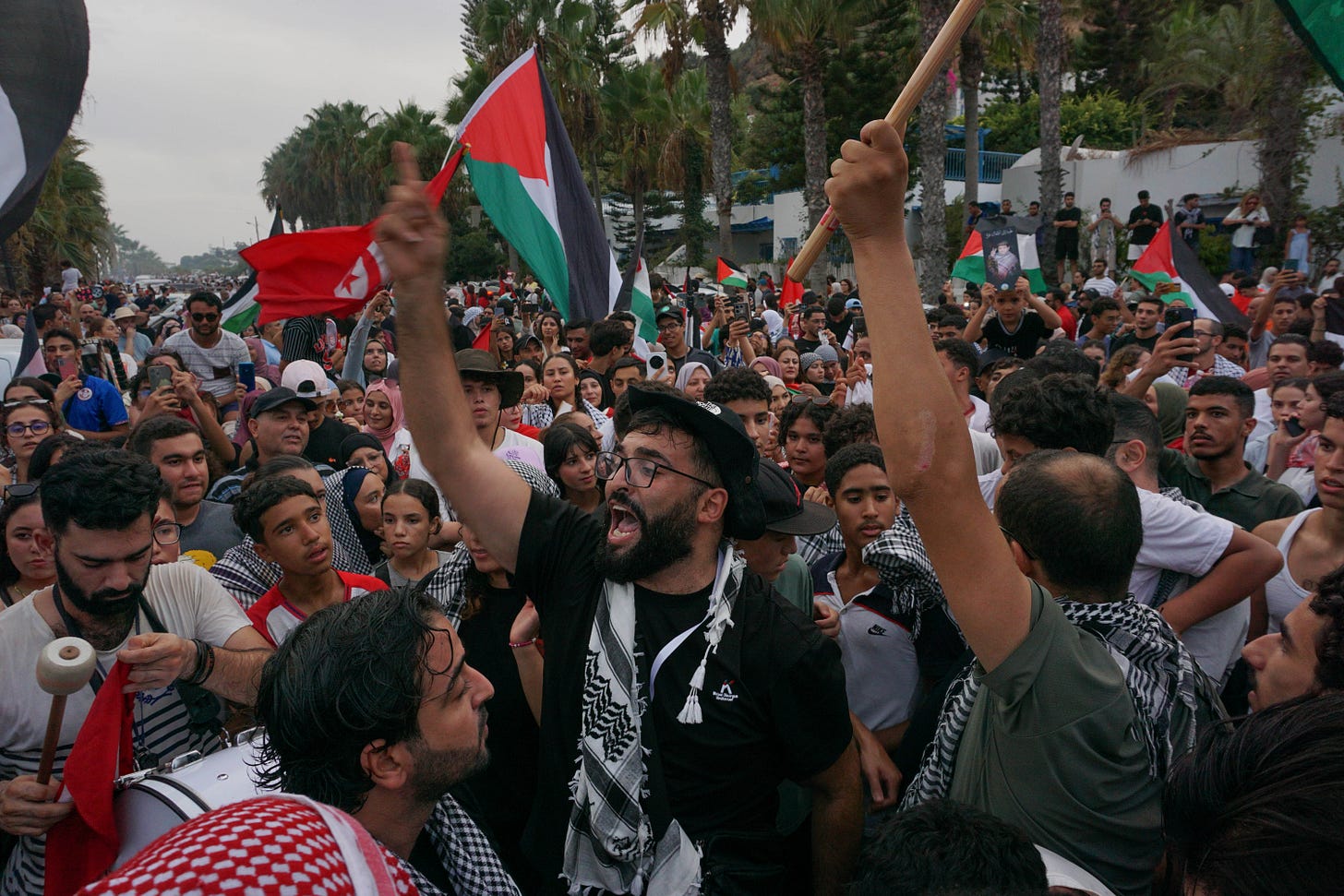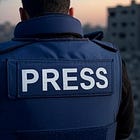Why Is the 'Free Palestine' Crowd Trying to Kill the Ceasefire?
Palestinians in Gaza are imploring Hamas to accept the U.S. ceasefire plan that would finally end the war. Why, then, are their purported advocates trying to undermine it?

Editor’s note: We hadn’t planned on publishing again until after Yom Kippur, but the events of the past 48 hours have been too striking to ignore. The responses to the U.S. ceasefire proposal have been telling and should cause us all to reflect on who truly has Palestinians’ and Israelis’ best interests at heart — and who does not. Wishing all observing the holiday a G’mar Hatima Tova and an easy and meaningful fast from Jerusalem. — A.M.
Shortly after midnight between Monday and Tuesday, two hours after the White House press conference in which President Trump laid out the U.S. plan for a ceasefire between Israel and Hamas and Prime Minister Netanyahu accepted it, Gaza-based political analyst Hussein Jamal posed a question in Arabic to his 32,000 followers on X:
“A question for the people of Gaza only, and I hope only Gazans will answer it: If you were in [Hamas leader] Khalil Al-Hayya’s place, and the American initiative was offered to you, would you accept it or reject it?”
“With my eyes closed, I would accept it,” responded one user. “The most important thing is to stop this nightmare. People in Gaza can’t breathe.”
“I would accept it without discussion,” wrote another.
“Accept, accept, accept,” added a third.
They weren’t alone.
A torrent of posts by social media users in Gaza — most anonymous and almost all writing in Arabic — appeared overnight, imploring Hamas to accept the proposed ceasefire and bring the war to an end.
“I call upon the Hamas movement to deliver to us and to the nation the speech of deferred victory, and to accept the proposed American deal,” wrote an X user who identified as Dr. Eman and gave her location as northern Gaza. “Save us, please.”
“Accept anything — just accept,” wrote Adnan in Gaza City. “There’s nothing more precious than the people. Call it whatever you want. Enough blood, by God.”
Some directed their ire at those opining on the proposal from afar.
“Living in a tent — no. Your house got bombed — no. Displaced — no. Slept on the street — no. Lost someone from your family — no. Got injured — no. Went hungry — no. So why are you giving your opinion on the proposal?” asked Mohammed in Jabalia.
“All your analyses about war, resilience, and negotiation are just empty talk from a place of comfort,” summarized Jamal. “Come live one day under attack in a tent or on the street and then share your analyses.”
As Hamas continues to hem and haw — saying it will “study” the plan and consult with other terrorist groups before giving an answer — an unmistakable rift is emerging between Palestinians in Gaza and those purporting to advocate on their behalf around the world.
After nearly two years howling about the war, branding it a “genocide” and demanding an immediate ceasefire, the global “Free Palestine” crowd suddenly doesn’t seem all that eager to see it end. Rather than enthusiastically embracing the U.S. plan, which has been endorsed by a slew of Arab and Muslim governments, some of Israel’s most prominent and vociferous critics have either fallen curiously silent — or have launched broadsides against it.
“The trap of the century,” declared United Nations special rapporteur Francesca Albanese as she circulated a text arguing that the proposal “should be opposed and rejected.” “No matters [sic] how many hands clap, this plan is in breach of international law,” Albanese added.
“Just more colonial repression and Israeli impunity, guaranteed by the complicit U.S.,” charged former senior UN official Craig Mokhiber, who called Israel’s war against Hamas a “textbook genocide” on October 28, 2023 — a mere three weeks after the October 7 attacks and just one day after Israel launched its ground campaign in Gaza.
“We cannot legitimize this farce,” said Spanish Second Deputy Prime Minister Yolanda Díaz, claiming that the proposal “perpetuates the occupation” and “consolidates Israel’s impunity.”
“The Trump-Netanyahu plan for Gaza is cruel blackmail,” wrote Syrian-born French politician Rima Hassan — who famously participated in the June precursor to the current flotilla to Gaza — in a lengthy screed. “This plan does not aim for peace. It institutionalizes the colonial management of Gaza and enshrines the submission to the United States of the states that support it.”
“‘Deradicalisation’ is a sanitised term for neutering Palestinians and forcing them to accept their subjugation,” said former Al Jazeera and Reuters editor Barry Malone in one of more than a dozen furious tweets trashing the plan and its various components. “It is not radical to fight for your freedom.”
The contrast between the emerging consensus among the “pro-Palestine” crowd and the cries of actual Palestinians in Gaza could hardly be starker. And it begs urgent questions about just how deeply the Palestinians’ supposed supporters care about their wellbeing and whether they are simply instrumentalizing — and, at this point, actively trying to perpetuate — their suffering to attack Israel.
Gaza-born Palestinian activist and writer Hamza Howidy may have put it best.
“I opened my feed today to see countless posts by Gazans desperate to see an end to this war by any way possible and the huge disappointment they have after many of those who claimed to stand with them during the past two years [have asked] the Gazans to continue get[ting] killed because they don’t like the Trump proposal to end the war,” he wrote Tuesday morning. “Shame on everyone who used their name and refuses to listen to their needs.”
Inundated by angry responses on the part of many such activists, Howidy later put up a second post.
“Apparently one post about Gazans’ opinions was enough to upset lots of those who worship Hamas and its fantasy of ‘armed resistance,’” he wrote. “Anyway, as my friends in Gaza told me, anyone who wants to lecture them on resistance and what they should and shouldn’t accept should go spend two days in a tent in Gaza amidst relentless bombardment, and then they would listen to them.”
It is notable that the critics of the ceasefire proposal include some of the individuals who first accused Israel of “genocide” and have worked assiduously to popularize the smear over the past two years.
Indeed, it is hard to imagine anyone witnessing an actual genocide and claiming to fight for its victims — say, during the Holocaust — quibbling over the technicalities or optics of a plan to end it and save lives in immediate peril.
That so many “pro-Palestine” activists are openly bashing the U.S. proposal to immediately end the war — and, in some cases, openly calling on Hamas to reject it — raises two possibilities: that they never actually believed it was a genocide at all, or that the suffering of Palestinian civilians in Gaza is secondary to their utility as a cudgel against Israel.
It increasingly seems as though both are true.
The “Free Palestine” crowd would be perfectly content to sacrifice the people on the ground, Palestinians and Israelis alike, on the altar of their forever war against the Jewish state. We must not let them. Now is the time for people of conscience around the world to drown out the hate and elevate the voices of those who live in this narrow strip of land and want nothing more than to leave this nightmare behind them.
When this war ends — and it will end — it will be despite the “Free Palestine” crowd, not because of them. And we will remember.





Both are true. "They never actually believed it was a genocide AND the suffering of Palestinian civilians in Gaza is secondary to their utility as a cudgel against Israel." Great article, thank you.
There is an interesting parallel (though far from exact) in which Gazans now discover that their supporters have been using them to advance an agenda that, when push comes to shove, is contrary to their interests and what Progressive Jews discovered after October 7.
It’s the typical “revolutionary” ethos where the elite (sometimes calling itself the “vanguard”) imagine they see things better and understand more deeply than the people actually affected. In this mental universe, facts don’t matter, the framework created by the theory counts. And those who disagree with the diagnosis, they are guilty of “false consciousness” and need to be reeducated.
The split between the offshore Hamas supporters and the Gaza civilians on the ground is entirely predictable.
The real question, though, is not whether Gazans want this war to end - they are smart enough to recognize defeat when they see it.
The question is whether the catastrophe wrought by Hamas, call it Nakba 2.0 if you will, is bad enough to discredit the genocidal Hamas terror group and the malevolent, anti-West program of the Muslim Brotherhood.
If not, then those whose goal is Israel’s destruction will bide their time and try again when they deem the circumstances to be favorable. And the suffering will begin again - presumably to the delight of those cowardly anti-Zionists who will cheer from the comfort of their far away homes, blissfully unaffected by the mayhem.